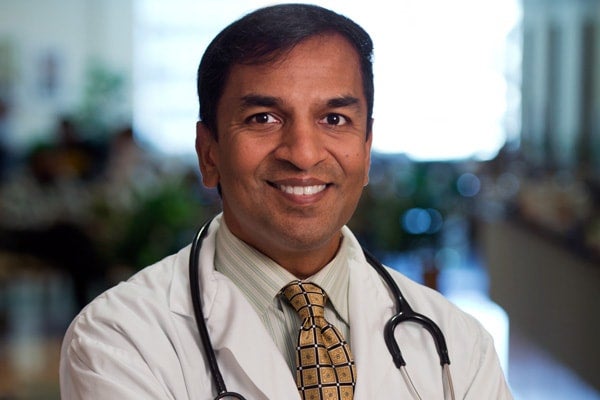
Understanding organ donation: Q & A with Dr. Atul Humar
Published: January 15, 2014
Every three days in Ontario, someone dies waiting for an organ transplant. Transplant medicine has grown by leaps and bounds in the last decade, but the supply of organs and tissue has not kept pace with demand. Toronto, in particular, has some of the lowest donor registration rates in Canada.
On January 13, 2014, the University of Toronto launched a campaign to encourage faculty, staff and students to register as organ and tissue donors. Those interested can check their status or register at https://beadonor.ca/uoft. The process only takes two minutes with a valid Ontario health card or photo identification.
Dr. Atul Humar is a professor in the Department of Medicine and the new medical director of the multi-organ transplant program at University Health Network. He is also the new director of the University of Toronto Transplantation Institute. He recently spoke with Faculty of Medicine writer Jim Oldfield about the importance of organ and tissue donation, transplant medicine, and why he returned to Toronto from the University of Alberta.
What should people know about organ and tissue donation?
Many people don’t realize that one person can save up to eight lives through organ donation, and save or improve quality of life for up to 75 others through tissue donation. Moreover, organ and tissue donation save lives in a transformational way — patients often go from one extreme of health to the other. Many patients will tell you that receiving an organ was the defining moment of their lives.
How can we improve donor registration rates in Ontario?
Donor registration rates in Ontario are comparable to, or better than other provinces, but in the Greater Toronto Area, we have an opportunity to do much better. A large majority of Ontarians support organ and tissue donation, but less than 25 per cent have registered as donors. Many people believe they are registered because they signed a paper donor card, but the province doesn’t track signed cards and next-of-kin consent is often lost when family members don’t know the wishes of their loved ones. So raising awareness about registration is critical to improving organ and tissue donation rates.
You began your career at U of T, but spent the last six years in Alberta. What drew you back to Toronto?
U of T and its affiliated hospitals have an outstanding transplant program, and there is huge potential for this program to become the very best in the world. My predecessor Dr. Gary Levy, with strong institutional support, gathered a critical mass of talented people in clinical care, research and education. With a better supply of donor organs and tissue, we could save many more lives, and some of the research underway here is changing the field.
What does the future hold for transplant medicine?
Advances in regenerative medicine and related technologies will allow us to repair damaged organs, and ultimately to grow and transplant cells. This could help reduce the need for donor organs and tissue. And methods aimed at re-educating the immune system will limit rejection of transplanted organs and tissue, and reduce or eliminate the need for immunosuppressive medications, which have serious side effects. These new techniques will make a big difference in the lives of many.



